Publisher Jiyu Kokuminsha has announced this year's crop of nominees for Japanese buzzword of the year. The wide-ranging selection of 60 words and expressions -- many of which come from the worlds of politics, sports and entertainment -- were selected based on suggestions from the general public, and they provide an interesting look at some of the events, people and trends that had an impact on Japan in 2007.
A panel of judges will choose the year's grand prize winner and top 10 buzzwords from these 60 nominees. The final results will be announced on December 3.
The words and explanations are listed below in no particular order.
**********
UPDATE: On December 3, Jiyu Kokuminsha announced the year's top 10 buzzwords (2 grand prize winners and 8 runners-up).
Grand Prize Winners
- Something needs to be done (about Miyazaki) [(Miyazaki o) do gen ka sen to ikan -(宮崎を)どげんかせんといかん] (see #11 below)
- Hanikami Oji [ハニカミ王子] (see #17 below)
Runners-up
- Pension (that disappeared) [(kieta) nenkin - (消えた)年金] (see #15 below)
- Sonna no kankei nee [そんなの関係ねぇ] (see #21 below)
- Dondakee~ [どんだけぇ~] (see #23 below)
- The power of insensitivity [donkanryoku - 鈍感力] (see #32 below)
- Disguised food [shokuhin gisou] (see #36 below)
- Net cafe refugee [net cafe nanmin - ネットカフェ難民] (see #41 below)
- Giant meal [大食い] (see #47 below)
- Extremely hot day [moushobi - 猛暑日] (see #37 below)
- - - - - - - - - - - - - - - - - - - - - - - - - - - - - -
1. KY [abbreviation of kuki ga yomenai - 空気が読めない]: This is an abbreviation of the Japanese expression kuki ga yomenai ("can't read between the lines" or "can't sense the atmosphere"), which is used to describe indelicate or unperceptive people. Example: That guy is so KY.
2. Child-bearing machines [umu kikai - 産む機械]: Health minister Hakuo Yanagisawa sparked a controversy when he referred to women as "child-bearing machines" in a January speech about Japan's declining birthrate. In reference to how Japan might reverse the population decline, he said: "The number of women aged between 15 and 50 is fixed. Because the number of child-bearing machines and devices is fixed, all we can ask for is for them to do their best per head." [More]
3. Office fees [jimushohi - 事務所費]: Former farm minister Toshikatsu Matsuoka came under fire for his links to a bid-rigging scam and accounting irregularities. After claiming to have spent 28 million yen ($236,000) on "office fees," it came to light that the office he used was actually rent-free. He committed suicide in May, just before he was scheduled to appear before the Diet to answer questions about his involvement in a political finance scandal. [More]
4. Some sort of regenerated water [nantoka kangensui - ナントカ還元水]: Former farm minister Matsuoka explained that some of the "office fees" were used to pay for the expensive tap water that everyone in his office drank. He referred to the water as "some sort of regenerated water." [More]
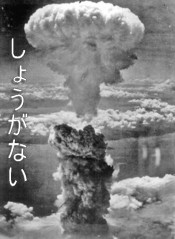 5. It couldn't be helped [shouganai - しょうがない]: In a June speech, former defense minister Fumio Kyuma said: "I understand the bombing (in Nagasaki) brought the war to its end. I think it was something that couldn't be helped." His controversial remarks were widely interpreted as a justification for the US atomic bombings. He resigned three days later under a firestorm of criticism. [More]
5. It couldn't be helped [shouganai - しょうがない]: In a June speech, former defense minister Fumio Kyuma said: "I understand the bombing (in Nagasaki) brought the war to its end. I think it was something that couldn't be helped." His controversial remarks were widely interpreted as a justification for the US atomic bombings. He resigned three days later under a firestorm of criticism. [More]
6. Cabinet of friends [o-tomodachi naikaku - お友達内閣]: "Cabinet of friends" was used to describe former Prime Minister Shinzo Abe's first Cabinet, which was criticized for being filled with old friends who were not seen as competent to serve as ministers. By the time Abe got around to reshuffling his Cabinet in August, three scandal-ridden buddies had been forced to resign and another had committed suicide before being questioned about financial irregularities. [More]
7. Back-to-the-wall Cabinet [haisui no jin naikaku - 背水の陣内閣]: After a disastrous year of scandals and an election defeat under Prime Minister Shinzo Abe, who resigned abruptly on September 12, the ruling Liberal Democratic Party (LDP) chose veteran Yasuo Fukuda as the new Prime Minister. After choosing his new ministers, he referred to them as the "Back-to-the-wall Cabinet," because they now have their "backs against the wall" as they try to revive the standing of the LDP. [More]
8. Symbiosis [kyousei - 共生]: In a general sense, "symbiosis" means the living together of two or more organisms of different species. Prime Minister Fukuda used the phrase "independence and symbiosis" to describe his policy goals for breaching the widening economic disparity between Japan's big cities and rural towns. [More]
9. Madame Sushi [マダム・スシ]: When giving a lecture during a visit to Washington, former defense minister Yuriko Koike said to the audience: "Some people call me the 'Japanese Rice' after Madame Secretary Rice. Why don't you call me 'Madame Sushi'?" In Japan, 'rice' means 'sushi.' [Video]
10. Sonomanma Shock [そのまんまショック]: Without the support of any political party, former comedian Sonomanma Higashi won the Miyazaki gubernatorial election with 44% of the vote. Seen as a sign of voter disillusionment with mainstream politics, his resounding victory sent shockwaves through the Liberal Democratic Party. [More]
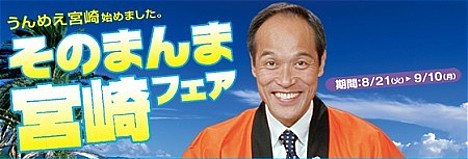
11. Something needs to be done (about Miyazaki) [(Miyazaki o) do gen ka sen to ikan - (宮崎を)どげんかせんといかん]: When outlining his policy to the prefectural assembly, Miyazaki governor-elect Hideo Higashikokubaru (a.k.a. Sonomanma Higashi) peppered his speech with Miyazaki dialect, saying things like "Do gen ka sen to ikan" ("something needs to be done") in reference to the need to escape from the old ball and chain that has become the root of stagnation.
12. Miyazaki salesman [Miyazaki no salesman - 宮崎のセールスマン]: Miyazaki governor-elect Hideo Higashikokubaru (a.k.a. Sonomanma Higashi) began delivering on his promise to serve as a "Miyazaki salesman." At least one report estimates that, thanks to his name recognition, he brought Miyazaki prefecture 16 billion yen ($140 million) worth of PR coverage during his first two weeks in office.
13. Physical exam [shintai kensa - 身体検査]: This expression refers to the thorough background checks that former Prime Minister Abe promised to conduct in order to ensure that Cabinet officials were "clean" before appointing them to office. Abe supposedly performed an extensive "physical exam" on Takehiko Endo, who took over as farm minister after his predecessors, Matsuoka and Akagi, were removed for their roles in financial scandals. Despite his "physical exam," Endo resigned after only eight days in office when he was found to be involved in a money scandal. [More]
14. Princess defeats the tiger [hime no tora taiji - 姫の虎退治]: In Okayama, Democratic Party of Japan (DPJ) candidate Yumiko Himei defeated Liberal Democratic Party (LDP) heavyweight Toranosuke Katayama to win her first election to the upper house. Her campaign slogan was "the princess will defeat the tiger," which was a play on her and her opponent's names. The hime in Himei means "princess," while the tora in Toranosuke means "tiger." [More]
15. Pension (that disappeared) [(kieta) nenkin - (消えた)年金)]: Pensions topped the headlines after a government blunder resulted in the disappearance of at least 50 million public pension account records, shortchanging an unknown number of retirees. Oops. [More]
 16. Ogushio [オグシオ]: Ogushio is the nickname (abbreviation) given to the women's doubles badminton team, Kumiko Ogura (Ogu) and Reiko Shiota (Shio), who also happen to be rather good-looking. Their official photo collection, called "Road to Beijing," created a stir when it was released. Okushio are aiming for gold in the Beijing Olympics. [More]
16. Ogushio [オグシオ]: Ogushio is the nickname (abbreviation) given to the women's doubles badminton team, Kumiko Ogura (Ogu) and Reiko Shiota (Shio), who also happen to be rather good-looking. Their official photo collection, called "Road to Beijing," created a stir when it was released. Okushio are aiming for gold in the Beijing Olympics. [More]
17. Hanikami Oji [hanikami ouji - ハニカミ王子]: Hanikami Oji ("bashful prince") is the nickname given to Ryo Ishikawa, who at age 15 became the youngest man ever to win a regular tournament on the Japanese golf tour.
18: Kawaigari [kawaigari - かわいがり]: Kawaigari usually means to "cherish" or "take under one's wing," but in the world of sumo it refers to the tradition of severe "training" given to rookie wrestlers at sumo stables. At the Tokitsukaze sumo stable, 17-year-old rookie Takashi Saito died after he was beaten with a metal bat as part of his kawaigari. [More]
19. Thumbing [サミング]: In boxing, "thumbing" is the illegal act of using one's thumb to poke the opponent in the eye. Boxer Daiki Kameda, who fought dirty in the WBC flyweight title match that pitted him against defending champion Daisuke Naito, used a number of underhanded tactics, including thumbing. At one point, Kameda (who lost the fight by decision) lifted the champion and threw him down. The Japan Boxing Commission suspended Kameda for one year. [More]
20. I lived up to the people's expectations [kokumin o kitai ni kotaeraremashita - 国民の期待に応えられました]: WBC flyweight champion Daisuke Naito spoke these words in his victory speech after defeating challenger Daiki Kameda in the dirty title match. His response to questions after the fight earned him great respect, as did his sportsmanlike attitude when Kameda later apologized.
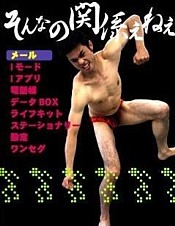 21. Sonna no kankei nee [そんなの関係ねぇ]: Sonna no kankei nee ("It doesn't matter!") is the catchphrase from comedian Yoshio Kojima's wildly famous routine. Thanks to YouTube, Kojima's popularity has spread quickly across the globe.
21. Sonna no kankei nee [そんなの関係ねぇ]: Sonna no kankei nee ("It doesn't matter!") is the catchphrase from comedian Yoshio Kojima's wildly famous routine. Thanks to YouTube, Kojima's popularity has spread quickly across the globe.
22. Oppappi [オッパッピー]: This is the other famous line from Kojima's routine, which is apparently an abbreviation of "Ocean Pacific Peace."
23. Dondake~ [どんだけぇ~]: This catch-all exclamation of surprise/disbelief/reproach arose from the Shinjuku 2-chome gay community and was popularized by Ikko, a popular transvestite TV personality. Dondake~ can be used in a wide variety of situations, sort of like "Really?!" or "No way!" Usually said with a slight rising intonation and seasoned with whiny sarcasm. [More]
24. Oubei ka! [欧米か!]: Oubei ka! ("You're not a Westerner!") is the catchphrase of comedy duo Taka and Toshi. In a typical skit, Taka acts as if he were an American or European, and Toshi tells him to stop acting silly (like a Westerner) by saying "Oubei ka!" The humor apparently lies in the fact that they are both obviously Japanese, and not from America or Europe. [More]
25. Victory!/ Billy's Bootcamp [ビクトリー/ビリーズブートキャンプ]: Billy's Bootcamp, the 7-day DVD exercise program developed by Tae Bo guru Billy Blanks, took Japan by storm in 2007, selling over a million copies. After completing the program, you are supposed to cry "Victory!"
26. Sen no kaze ni natte [千の風になって]: Sen no kaze ni natte ("become 1,000 winds") is the title of a song performed by opera singer Masafumi Akikawa. Based on writer Man Arai's translation of "Do Not Stand at My Grave and Weep," an English-language poem penned by an unknown author, the song has sold more than a million CDs, making Akikawa the most successful opera singer in Japanese history. [More]
27. Gabai (whirlwind) [gabai (senpuu) - がばい(旋風)]: Gabai, which means "very" in the Saga (western Honshu central Kyushu) dialect, was made famous by Gabai Baachan ("Gabai Granny"), a movie based on a bestseller written by comedian Shimada Yoshichi about his childhood experience growing up under the care of his grandmother. In summer, the mass media began using the unusual expression gabai senpuu ("gabai whirlwind") in reference to the Sagakita high school baseball team, who won the national championship. [More]
28. Bottom-biting bug [oshiri kajiri mushi - おしりかじり虫]: Oshiri Kajiri Mushi ("Bottom Biting Bug"), the popular song about a dancing bug that likes to bite people on the butt, became a huge hit on Minna No Uta, a daily NHK program featuring original animated videos for family-oriented songs. Oshiri Kajiri Mushi became the featured dance number at this year's school athletic meets, cultural festivals and other events nationwide. [Video]
29. Nothing really... [betsu ni... - 別に・・・]: Actress Erika Sawajiri made headlines and flustered fans when she appeared visibly angry alongside her co-stars at a promo event for "Closed Note" (her latest movie) on September 29. When the hostess of the event asked the sulky Sawajiri which scene was her favorite, Sawajiri spat a snippety, "None in particular" (toku ni nai desu), and when asked what she was thinking when she made a batch of cookies for the cast and crew during shooting, she hissed, "Nothing really" (betsu ni). [More/ Video]
30. Dried-fish woman [himono onna - 干物女]: Himono onna ("dried-fish woman") is an expression used in the movie Hotaru No Hikari to describe the main character, a woman in her 20s who has renounced the pursuit of romance. She spends her evenings reading manga and drinking at home alone, and she spends her weekends lazing around in bed. She's a dried-fish woman.
31. "Status-gap marriage" [kakusakon - 格差婚]: A "status-gap marriage" is one in which there is a clear gap in income, pedigree, social status, etc. between the husband and wife. The phrase usually refers to marriages in which a woman marries "beneath herself," such as the marriage between actress Norika Fujiwara and her husband, the lesser-known comedian Tomonori Jinnai.
32. The power of insensitivity [donkanryoku - 鈍感力]: Made popular by Donkanryoku (The Power of Insensitivity), a best-selling book written by popular novelist Junichi Watanabe, this expression means something like "thick skin" and refers to the ability to live in a relaxed manner without getting worked up over the little things.
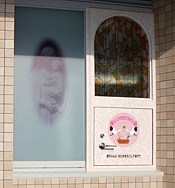 33. Akachan post [赤ちゃんポスト]: Akachan post ("baby post") refers to the controversial drop box for unwanted babies set up at a hospital in Kumamoto this year, which is designed to provide parents a safe and anonymous way to abandon their babies. Similar baby hatches have been set up in the past, including one at a foster home in Japan's Gunma prefecture that was used from 1986 to 1991.
33. Akachan post [赤ちゃんポスト]: Akachan post ("baby post") refers to the controversial drop box for unwanted babies set up at a hospital in Kumamoto this year, which is designed to provide parents a safe and anonymous way to abandon their babies. Similar baby hatches have been set up in the past, including one at a foster home in Japan's Gunma prefecture that was used from 1986 to 1991.
34. One-yen products (one-yen pachinko, one-yen cellphone) [1-en mono - 1円もの]: Products that cost one yen are becoming popular. This year, some pachinko parlors reduced the price of balls to one yen each (down from four yen each), and some cellphone providers cut the price of featured handsets to one yen.
35. Tetsuko [鉄子]: The unhealthy obsession with trains has long been a predominantly male pursuit, but the numbers of female train otaku -- known as "Tetsuko" -- are on the rise. [More]
36. Disguised beef (disguised meat) [minchi gisou (gisou shokuniku)]: The Hokkaido-based Meat Hope Co. admitted to adding pork and chicken to its ground beef products to cut production costs. [More]
37. Extremely hot day [moushobi - 猛暑日]: "Extremely hot day," an expression officially adopted by the Meteorological Agency, refers to days in which the high temperature reaches 35 degrees Celsius (95 degrees Fahrenheit). The number of extremely hot days has increased significantly over the past 10 years, causing heat strokes and other health problems. In 2007, the towns of Tajimi (Gifu prefecture) and Kumagaya (Saitama prefecture) experienced record highs of 40.9 degrees Celsius (105.6 degrees Fahrenheit).
38. Hometown tax [furusato nouzei - ふるさと納税]: Under the proposed "hometown tax" concept, about 10% of each individual's local taxes (resident tax) are redistributed to his/her hometown (place of birth). This idea is being studied as a way to narrow Japan's growing financial gap between wealthy urban areas and poor rural areas. Metropolitan government leaders oppose the idea, but rural leaders insist that the wealthy urban areas are indebted to the hometowns from which their residents have come. [More]
39. Monster parents [モンスターペアレント]: The term "monster parents" refers to Japan's growing ranks of annoying parents who make extravagant and unreasonable demands of their children's schools. [More]
40. Dark website [yami site - 闇サイト]: Yami sites ("dark websites") are online networking sites where people can take out hit contracts on others, make illegal transactions (drugs, fake bank accounts, hacked cellphones, prostitution, etc.), and meet suicide partners. Japan has seen a recent rise in the number of murders arranged through these web-based hotbeds of criminal activity.
41. Net cafe refugees [net cafe nanmin - ネットカフェ難民]: "Net cafe refugees" is an expression used by the Japanese media to refer to the growing number of day laborers who spend their nights in 24-hour internet cafe booths. The Japan Cafe Complex Association (JCCA) opposes the media's use of the word "refugee" to describe these important customers. A government survey this year estimates there are about 5,400 net cafe refugees in Japan. [More]
42. Detox [デトックス]: "Detox" refers to the process of ridding the body of toxins such as mercury, lead and cadmium, usually by taking supplements, eating properly, exercising, or using special bath salts.
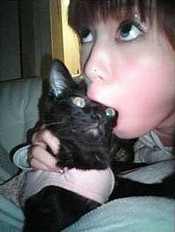 43. Kawayusu/Giza-kawayusu [カワユス/ギザカワユス]: Kawayusu and giza-kawayusu are words
43. Kawayusu/Giza-kawayusu [カワユス/ギザカワユス]: Kawayusu and giza-kawayusu are words coined popularized by idol and avid blogger Shoko Nakagawa ("Shokotan"). Kawayusu is a variation of kawaii desu ("cute"), while giza, which means "very," is derived from "giga."
44. Compliance [コンプライアンス]: "Compliance" used to simply mean compliance with the law, but it has recently come to mean compliance with ethical standards and rules that industry groups and companies impose on themselves. The word has grown in popularity as companies feel ever-increasing pressure to maintain a clean image.
45. Metal thief [kinzoku doro - 金属ドロ]: Japan has seen a sharp increase in the theft of metal objects, such as manhole covers, incense burners at cemeteries, water faucets, copper signs, temple bells, and metal park slides. These metal thefts appear to be part of a larger worldwide trend fueled by the rising prices of steel and copper. [More]
46. China shock/China-free [チャイナショック/チャイナフリー]: "China shock" refers to the impact felt in world markets after the Shanghai Composite Index took a steep plunge in February. "China-free," a phrase that grew in popularity after a string of Chinese products (toothpaste, toys, etc.) were found to contain hazardous materials, refers to products not made in China. [More]
47. Mega- (giant meals) [O-gui (mega-____ ) - 大食い(メガ○○)]: Over the past year, a number of mega-sized meals and high-calorie food products have appeared on the market, such as cup ramen, pudding, ice cream and hamburgers. Some say this trend is a reaction against the recent health food boom, while others see it is as a sign of economic recovery.
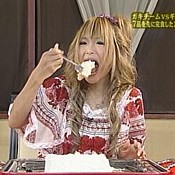 48. Food fighter [フードファイター]: "Food fighters" are people with extraordinary eating skills that allow them to consume food in large quantities and/or at high speeds. Like athletes, food fighters train everyday in order to win eating competitions. The popularity of gluttonous TV celebrity (and freak of nature) Gal Sone has helped fuel this boom.
48. Food fighter [フードファイター]: "Food fighters" are people with extraordinary eating skills that allow them to consume food in large quantities and/or at high speeds. Like athletes, food fighters train everyday in order to win eating competitions. The popularity of gluttonous TV celebrity (and freak of nature) Gal Sone has helped fuel this boom.
49. Working poor [ワーキングプア]: The "working poor" are employed individuals and/or families whose income falls below the poverty line. The Japanese government does not have a formal definition of "working poor" even though the term is widely used.
50. Disablement (of nuclear facilities) [(kakushisetsu no) munouryokuka - (核施設の)無能力化]: In the six-party talks that aim to find a peaceful resolution to the security concerns resulting from North Korea's nuclear weapons program, there has been much talk about the disablement of the Yongbyon nuclear facility.
51. Motepuyo [もてぷよ]: Motepuyo, a term that means something like "chubby cute," describes women who are plump, small in stature, and cute. With a fine line between motepuyo and chubby, some say the only difference is whether or not a woman has a cute face. [More]
52. An Inconvenient Truth [futsugou na shinjitsu - 不都合な真実]: Al Gore's Academy Award-winning documentary about global warming made a splash in Japan.
53. Otona-kawaii [大人かわいい]: Otona-kawaii ("adult cute") refers to the fashion style of women in their late 20s to 30s who wear girlie outfits like jumper skirts and mini-dresses adorned with lace and ribbon. Otona-kawaii became the special catchphrase of AneCan magazine.
54. Temp [haken - ハケン]: Haken No Hinkaku ("The Pride of the Temp") was a popular TV drama about a highly-skilled temporary worker named Haruko Oomae, played by actress Ryoko Shinohara. The drama was said to have accurately portrayed the differences between permanent staff and temporary staff in Japanese companies. [More]

55. Factory moe [koujou moe - 工場萌え]: This year saw a mini-boom in the off-the-wall genre of factory moe photo books focusing on the functional beauty of large-scale industrial plants.
56. Flaming [enjou - 炎上]: Enjou refers to the Japanese style of mass online "flaming," where large numbers of visitors converge on a particular blog to leave inflammatory comments, often causing the site to fail. Nastier than the Digg effect.
57. Dice-K: The nickname that American fans have given to Boston Red Sox pitcher Daisuke Matsuzaka is now commonly used in Japan.
58. Recapture [dakkai - 奪回]: Dakkai ("recapture") was the slogan adopted by the Yomiuri Giants pro baseball team for the 2007 season. The team won the Central League title for the first time in 5 years, but lost to the Chunichi Dragons in the Climax Series playoffs.
59. Handkerchief generation [hankachi sedai - ハンカチ世代]: Yuuki Saito, the ace pitcher of the 2006 Waseda Jitsugyo high school baseball team that won the national championship, was known as the "handkerchief prince" because he often used a handkerchief to dab the sweat from his brow during games. Collectively, those players who graduated along with Saito and entered the college and professional ranks in the 2007 season are referred to as the "handkerchief generation." [More]
60. Ru-speak [(ichiren no) ruugo - (一連の)ルー語]: "Ru-speak" refers to comedian/actor Ru Oshiba's unique style of mixing English words with Japanese.
[Source: U-Can Buzzwords of the Year]

helical
The first one has an interesting aspect to it which may or may not be a media consipiracy to overwrite the original meaning with an alternate one in the public's mind:)
[]About 20 years ago, a reporter for the Asahi Shimbun reported that there was a problem with vandalism on the coral reefs of Okinawa, and as proof, he had a photograph of the letters 'KY' etched into the coral. He claimed in the article that it was an example of an inconsiderate diver leaving his initials. It was later exposed (by the exhaustive investigation of the local residents) as a fraud where the reporter himself etched the letters, and Asahi Shimbun was forced to apologize, both for lying and vandalism.
Hunty
What, no "nice boat"???
[]Derek Lin
Re: #43
"Kawayusu" and "gizakawayusu" are not terms coined by Shokotan; they are part of a vocabulary used by denizens of 2-channel (www.2ch.net), an extensive forum site. A large portion of users identify as "otaku", and Shoko is a celebrity who flouts her "otaku-ness".
[]Erika
"Gabai" = Saga is in Central Kyushu, not western Honshu.
[]B
What about "doing an Abe" - to quit suddenly just having started something.
[]gil
Oubei Ka!? is not so much an exclamation that "You're not a Westerner" so much as a disgusted question, "What're you, some dumb foreigner?"
[]Oubei (??) just means the West or Europe and leaving off jin (?) is regarded by some people as pretty insulting.
jessant
Response to gil: It wouldn't be Japan without the rampant racism. I'm not in the least surprised that that one is on here, though I was expecting more.
[]sasutan
Koujomoe is the winner for me. Top coffee table top reading.
[]NPC
Great list! What's up with Shokotan and putting cats in her mouth...
[]mindlos
what a funny year it was!
[]phew!
mo
[...] So apparently Japan has an award for popular phrases of the past year. Pink Tentacle has translated them all and explained the references [...]
[]